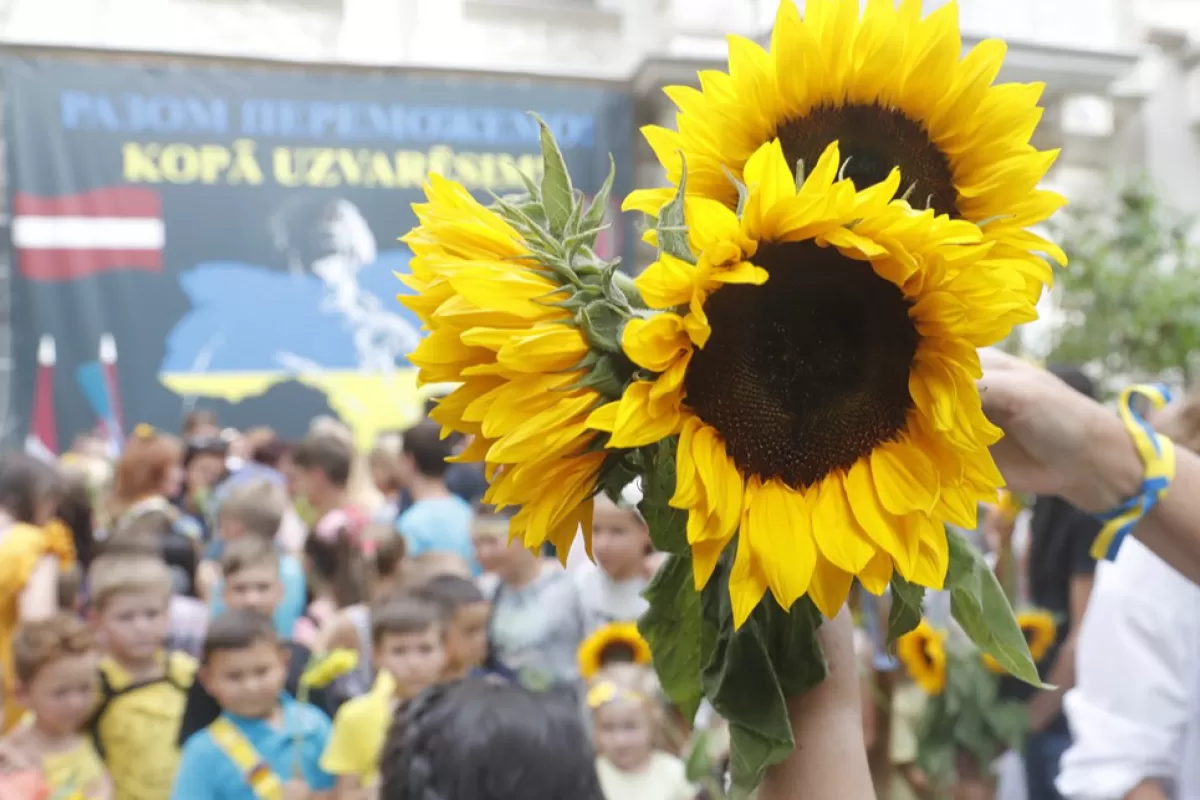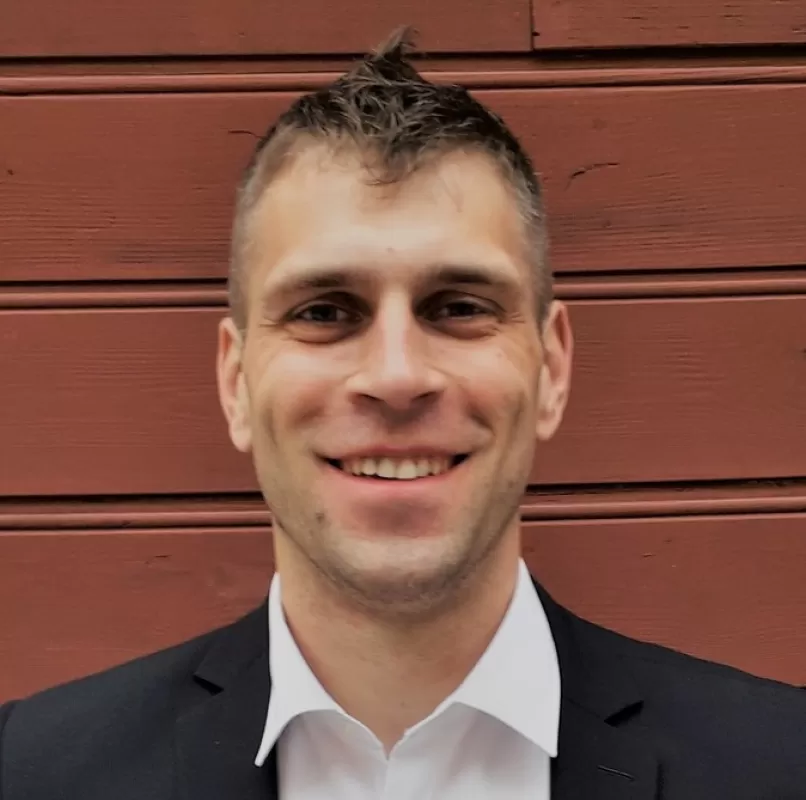
Latvia is a staunch supporter of Ukraine. However, around one quarter of its population is made up of Russian ethnics, and the number of those speaking Russian as a first language is higher. The war in Ukraine brought into focus the loyalties of that population – do they support Riga’s policy and Ukraine, or Russia’s aggression and president Vladimir Putin? No one seems to know the answer to that.
A lot of Russian-speaking people remain silent
In March 2022 – just a couple of weeks after the Russian invasion of Ukraine – the Latvian Television published the results of a survey which included a question regarding the side they were supporting in the Russia – Ukraine war. Russian speakers were more reserved. 22% expressed their support to Ukraine, and 21% to Russia, but 57% had either no response or had not supported either of the parties.
In July 2022, 47% of those the Russian speakers – a group that, besides Russian ethnics also includes Belarusians, Ukrainians, and sometimes also Poles and Lithuanians - expressed a neutral attitude or acknowledged that is hard to answer this question. 40% of respondents said that they support Ukraine and 12% - Russia. Since this time, there have not been any surveys on this matter, and experts are wondering what do these Russian-speaking people actually think.
Sociologist Vladislavs Volkovs emphasizes that it is impossible to say how many Russian-speaking people really support Russia. First of all, there was no serious research on this matter in Latvia, so there are no reliable statistics. Second, Russian-speaking people do not like to talk about this. “It is very hard to understand them and it’s really hard to find some serious discussion about these events. This is an existential situation for the Russian people. When people are experiencing an extreme situation, they choose to speak with God or themselves and prefer to search the individual solutions without public debate” explains Volkovs. On the other hand, Volkovs points out that the political party „Harmony”, which was very popular in Russian-speaking circles for almost 20 years, failed to get elected to the Parliament after its leaders condemned Russia’s attack on Ukraine.
The vice-chairman of the Latvian Russian Union, Miroslavs Mitrofanovs, also notes that Russian-speaking people in Latvia avoid expressing their opinion because they are afraid. “People are intimidated. There have been criminal or administrative proceedings against those who expressed their support for Russia,” says Mitrofanovs, noting that expressing support for Russia is a criminal offence. He estimates that support to Russia is “significantly larger, but I do not know how much”.
“That’s a big question,” says the journalist Inna Plavoka, working in the city of Daugavpils where she heads the online outlet “Chayka”. Daugavpils is a mainly Russian-speaking city. Only 21% of its population are ethnic Latvians. 48% are Russians, 13% Poles, etc. “Part of these people still do not understand what is happening [in Ukraine and Russia],” continues Plavoka. “Some part of them are rooting Russia, some for Latvia [Latvia’s position in the war regarding Ukraine]. People [the audience] are still asking what we [journalists] are going to do when Putin will win? We are going to do nothing. I am not thinking about it”. Plavoka recalls that one day after Russia launched its large scale invasion of Ukraine, “Chayka” condemned Russia and war and, following that, many of its traditional readers refused to renew their subscriptions and even called the journalists as fascists. At the same time, “Chayka” got new subscribers.
The war as a catalyst for other processes
The war in Ukraine brought into focus once more the relationship between Latvians and Russian-speaking people in general, particularly regarding the status of the Russian language in Latvia and the language reform in the schools. According to this reform, the children step by step must switch to learning more and more in Latvian. Also, during the past year Latvia has dismantled the Soviet monuments and has demanded that Russian and Belarussian citizens living in Latvia – around 18 000 people – learn the Latvian language at an average level. This idea also caused a stir, partly because some of these people were living in Latvia for many decades and accepted Russian citizenship just to go retire earlier and get a Russian pension.
Finally, there are discussions about dismantling the monuments that symbolize Russian culture and history, for instance, the monument dedicated to Russian poet Alexander Pushkin. On the one hand, those who want to see the monument taken away are saying that Pushkin has no connection with Latvia and it is just a way for Russia to marks its influence, on the other hand, those who want to keep the monument are saying that Pushkin doesn’t have any links with current Russia policies.
To be Latvian without being ethnic Latvian and knowing the Latvian language
Vladislava Romanova, who normally works as a creative director in one of the advertisement agencies in Riga, made a documentary about her native city Daugavpils. More precisely – what local people think about the war in Ukraine and how do they feel in Latvia. There were talks weather the population in Daugavpils is loyal to Latvia, for instance, after some locals protested that the Ukrainian flag was raised to one of the institutions. Also, the position of the mayor of Daugavpils Andrejs Elksnins was unclear.
She acknowledges that by birth she is a Russian-speaking person. Even more, for the first time she met Latvian language and Latvian culture quite late because she is coming from a Russian-speaking family that was not interested in Latvian culture. “But I consider myself a Latvian. I am not a Russian,” she says in perfect Latvian, emphasizing that her ancestors are Poles, Latvians, Germans, and Belarusians. Romanova stresses that people in Latvia must speak in Latvian in a public space. “I would like to call it common sense. You have to know the official language of the country where you are living. Nobody is going to force two Russian people to speak to each other in Latvian,” she says. Romanova insists that she knows many Russian-speaking people who now are ashamed of their weak knowledge of Latvian. “I feel very good in Latvia” concludes Romanova.
Plavoka is a Belorussian whose parents came to Latvia from Belarus at the end of the 1960s. “Back then there was one country (Soviet Union). We spoke in Russian and we did not imagine that there could be any other language. We felt as the hosts and we did not think that maybe it is not so,” remembers Plavoka. She says that during her childhood there were 17 schools in Daugavpils and only two of them were Latvian. She is not a Latvian citizen since she does not speak Latvian. However, she says that after the 24th of February she understood that she has made a mistake. “I was offended because I did not get automatically a citizenship,” explains Plavoka and continues: “When the war started, I did not have any doubts what “Chayka” is going to stand for. I saw Russia’s interests in our country. Putin showed that the slogan “We can repeat!” could be really implemented. Earlier I lived in Russia’s information space. Of course, I did not listen to Solovyov [famous Russian propagandist Vladimir Solovyov], but I liked to watch movies, including about the war. But I am not Russian. Yes, I speak Russian, but I was born and raised in Latvia. Yes, I cannot be a Latvian, but my son is Latvian since his father is Latvian. However, in tough times it is very important to be with your people. It is hard to say why Latvians and Latvia became my people. But I understood that I want to be with my country,” says Plavoka.
Concerns about the Russian’s future in Latvia
Not all Russian speakers are as pro-Latvian as Vladislava Romanova and Inna Plavoka. Mitrofanovs Miroslavs acknowledges that around half of the members of the Russian Latvians Union are pro-Kremlin and think that Western Countries are evil and Latvia is led by Washington.
Mitrofanovs himself admits that for many years he urged Europe and Russia to build good relationships: “I really believed in it”. Moreover, he participated as an observer of the 2014 referendum in Crimea about joining Russia – a referendum never acknowledged in Europe and Latvia. According to him, it was clear, that Crimeans wanted to be part of Russia. But when the war in Donbas started, he changed his mind. “24th of February was the shock for me. Till the very last moment I did not believe that it is going to start,” explains Mitrofanovs.
At the same time, he insists that Russians are offended by Latvians. “The feeling of offense, that this country is not ours, is getting stronger. Yes, this is a Latvian state but also ethnic minorities must have the opportunities to keep their identity, and part of the services provided by the state must be in their mother tongue. We are not enemies and we are not guests [here]”. Mitrofanovs rejects the school reform and the demands that Russian citizens in Latvia must know the Latvian language on an average level. He avoids to answer the question weather the Russian language must have some official status. However, according to him, Latvian and Russian-speaking children must go to the same schools – not separated into Latvian and Russian as now – and learn, mostly in Latvian, but some subjects in Russian.
Russian’s future in Latvia? From emigration to cooperation
Mitrofanovs predicts that many young Russian-speaking people will leave Latvia for Western countries. Because of the language policies, they do not feel comfortable and welcomed in Latvia.
Vladislava Romanova thinks that Latvia must invest in local Russian-language media and in education. The media could give Russian-speaking Latvians a healthier alternative to the media based inside Russia, while more motivated teachers would be more satisfied with life in Latvia and they will give this feeling to the children. At the same time, Latvians must remain active in providing help to Ukraine and avoid radicalism regarding the Russian language in Latvia.
Inna Plavoka warns that some part of Russian-speaking people must be perceived as a threat to Latvia. She remembers that when the Monument of Victory was dismantled in Riga, one young Ukrainian girl, a refugee, wrote an article for the “Chayka” about this event. She thinks that by looking at things through the eyes of Ukrainians, maybe pro-Kremlin people can change their minds.
Society was divided even before the 24th of February and the war just made these divisions deeper and stronger. It is hard to say what Russian-speaking people understand by the name „Latvia”, what kind of Latvia they would like to see and weather they have a feeling of belonging. “I do not have a solution. This is the first case in Latvia when Russians go through such trauma. This situation is unique but I have no vision of what to do,” says Vladislavs Volkovs.


